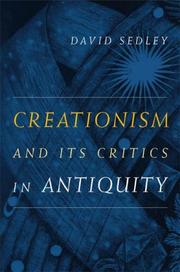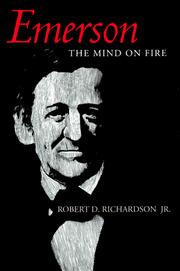| Listing 1 - 2 of 2 |
Sort by
|

ISBN: 128235938X 9786612359385 0520934369 9780520934368 9780520253643 0520253647 9780520260061 0520260066 6612359382 9781282359383 Year: 2007 Publisher: Berkeley : University of California Press,
Abstract | Keywords | Export | Availability | Bookmark
 Loading...
Loading...Choose an application
- Reference Manager
- EndNote
- RefWorks (Direct export to RefWorks)
The world is configured in ways that seem systematically hospitable to life forms, especially the human race. Is this the outcome of divine planning or simply of the laws of physics? Ancient Greeks and Romans famously disagreed on whether the cosmos was the product of design or accident. In this book, David Sedley examines this question and illuminates new historical perspectives on the pantheon of thinkers who laid the foundations of Western philosophy and science. Versions of what we call the "creationist" option were widely favored by the major thinkers of classical antiquity, including Plato, whose ideas on the subject prepared the ground for Aristotle's celebrated teleology. But Aristotle aligned himself with the anti-creationist lobby, whose most militant members--the atomists--sought to show how a world just like ours would form inevitably by sheer accident, given only the infinity of space and matter. This stimulating study explores seven major thinkers and philosophical movements enmeshed in the debate: Anaxagoras, Empedocles, Socrates, Plato, the atomists, Aristotle, and the Stoics.
Philosophy, Ancient. --- Intelligent design (Teleology) --- Ancient philosophy --- Greek philosophy --- Philosophy, Greek --- Philosophy, Roman --- Roman philosophy --- Design, Intelligent (Teleology) --- Natural theology --- Philosophy of nature --- Teleology --- Creationism --- God --- Proof, Teleological --- Philosophy, Ancient --- accident. --- anaxagoras. --- ancient greek. --- ancient rome. --- anti creationist. --- antiquity. --- aristotle. --- classical antiquity. --- classical world. --- controversial. --- controversy. --- cosmos. --- creationism. --- creationist. --- disagreement. --- divine. --- empedocles. --- famous philosopher. --- great thinkers. --- historical. --- intelligent design. --- philosopher. --- philosophy. --- plato. --- scientific. --- socrates. --- stoics. --- teleology. --- theology. --- theory. --- western philosophy. --- western science.

ISBN: 0520918371 0585249997 9780520918375 9780585249995 9780585249995 0520088085 0520206894 Year: 2015 Publisher: Berkeley, CA : University of California Press,
Abstract | Keywords | Export | Availability | Bookmark
 Loading...
Loading...Choose an application
- Reference Manager
- EndNote
- RefWorks (Direct export to RefWorks)
Ralph Waldo Emerson is one of the most important figures in the history of American thought, religion, and literature. The vitality of his writings and the unsettling power of his example continue to influence us more than a hundred years after his death. Now Robert D. Richardson Jr. brings to life an Emerson very different from the old stereotype of the passionless Sage of Concord. Drawing on a vast amount of new material, including correspondence among the Emerson brothers, Richardson gives us a rewarding intellectual biography that is also a portrait of the whole man.These pages present a young suitor, a grief-stricken widower, an affectionate father, and a man with an abiding genius for friendship. The great spokesman for individualism and self-reliance turns out to have been a good neighbor, an activist citizen, a loyal brother. Here is an Emerson who knew how to laugh, who was self-doubting as well as self-reliant, and who became the greatest intellectual adventurer of his age.Richardson has, as much as possible, let Emerson speak for himself through his published works, his many journals and notebooks, his letters, his reported conversations. This is not merely a study of Emerson's writing and his influence on others; it is Emerson's life as he experienced it. We see the failed minister, the struggling writer, the political reformer, the poetic liberator.The Emerson of this book not only influenced Thoreau, Fuller, Whitman, Dickinson, and Frost, he also inspired Nietzsche, William James, Baudelaire, Marcel Proust, Virginia Woolf, and Jorge Luis Borges. Emerson's timeliness is persistent and striking: his insistence that literature and science are not separate cultures, his emphasis on the worth of every individual, his respect for nature.Richardson gives careful attention to the enormous range of Emerson's readings-from Persian poets to George Sand-and to his many friendships and personal encounters-from Mary Moody Emerson to the Cherokee chiefs in Boston-evoking both the man and the times in which he lived. Throughout this book, Emerson's unquenchable vitality reaches across the decades, and his hold on us endures.
Authors, American --- Emerson, Ralph Waldo, --- Imarsana, Rāfa Vālḍō, --- Emerson, R. W. --- Emerson, Waldo, --- Emerson, R. Waldo --- Ėmerson, Ralʹf Uoldo, --- Ai-mo-sheng, --- Emarsan̲, --- אמרסון, רלף ולדו, --- עמערסון, ראלף וואלדא, --- Knowledge and learning. --- Emerson, Ralph Waldo, -- 1803-1882. --- Emerson, Ralph Waldo, -- 1803-1882 -- Knowledge and learning. --- Authors, American -- 19th century -- Biography. --- academic. --- activism. --- activist. --- american authors. --- american history. --- american literature. --- baudelaire. --- biographical. --- biography. --- contemporary literature. --- correspondence. --- dickinson. --- domestic. --- family life. --- famous author. --- famous philosopher. --- fuller. --- individualism. --- letters. --- life story. --- nietzsche. --- philosophy. --- proust. --- religion. --- sage of concord. --- scholarly. --- self reliance. --- stereotype. --- thoreau. --- true story. --- untold story. --- whitman. --- woolf.
| Listing 1 - 2 of 2 |
Sort by
|

 Search
Search Feedback
Feedback About UniCat
About UniCat  Help
Help News
News